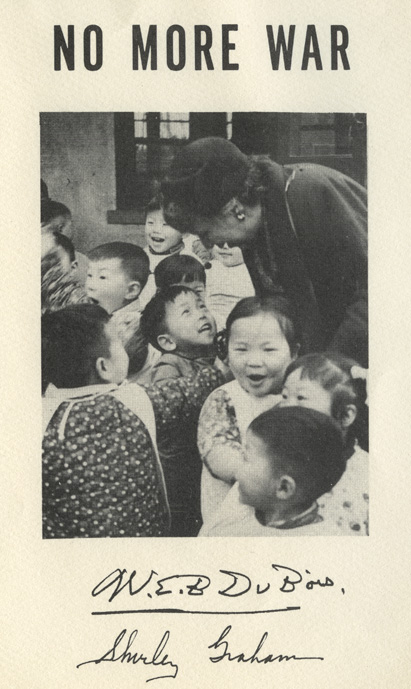Scope of collection
The bulk of the collection consists of letters from W.E.B. Du Bois to Lillian Hyman Katzman during the years 1952 to 1959, a portion of which she was employed as his secretary. Many of the letters were written while Du Bois and his wife, Shirley Graham Du Bois, were traveling or on lecture tours, and the content includes brief descriptions of their locations as well as directions for forwarding important mail, numbers to call, and checks to deposit. In others, Du Bois directs Katzman on how to answer requests for speeches or appearances as well as books and articles. He asks favors such as watering the flowers at his Grace Court apartment, sending air-mail copies of manuscripts to England, or purchasing specific grocery items in advance of their return to "insure us from starvation on arrival."
Correspondence dated after 1955 is more personal in nature, since Katzman was no longer employed by Du Bois. These letters describe his continuing research and provide updates on his health. Du Bois congratulates Lillian at the time of her marriage to Arthur Katzman, and invites her family to his New Year's Day celebration at Grace Court.
Finally, the correspondence includes letters between Katzman and David Levering Lewis. Lewis is the winner of two Pulitzer prizes for part one and two of his biography on W.E.B Du Bois. In one letter, she expresses regrets about leaving Du Bois's employment, but says it was necessary for financial reasons.
Katzman's continued interest in Du Bois and his work is reflected in the selection of articles and speeches she saved. The first article, "Forty-Two Years in the U.S.S.R" concerns two visits to the Soviet Union, the first prior to World War II and the second in the aftermath. Du Bois writes about the significant growth of arts and sciences under Communism, and commends advancements towards democracy. The second article, "The Vast Miracle of China Today," concerns his ten-week trip to China, during which he celebrated his 91st birthday. In it he discusses a brief history of China and praises the improvements made in education and equality during "the great leap" to Communism.
A pamphlet containing the keynote address at Madison Square Garden of the first meeting to launch the political campaign for the American Labor Party urges the public to vote for the third party and vote for peace. Another speech written for the annual convention of the Peace Progressive Party of Massachusetts highlights the effort to stop the fighting in Korea. Here he again urges voters to elect neither candidate from the Democratic or Republican parties and to choose a leader from the Progressive Party. There is an original copy of his pamphlet, "Peace is Dangerous," published by the The Guardian of his 1951 speech in New York, sponsored by the National Council for Arts, Sciences, & Professions and later revised for an Armistice Day address in Boston.
Copies of Albert Kahn's pamphlet "Agents of Peace," describe the arraignment of Dr. W.E.B. Du Bois as he faced criminal charges for failing to register the Peace Information Center as a foreign agent. Du Bois helped to establish the Peace Information Center, which endorsed the Stockholm Peace Appeal calling for a ban on atomic weapons. Considered a threat, the Department of Justice branded the Peace Information Center as a foreign agent and demanded that they register under the Foreign Agents Registration Act. The Center was eventually dissolved by the executive board, but they were charged by the Justice Department four months later. Kahn's was one in a series of pamphlets that argued for peace, all written in support of Du Bois during this time.
Articles about Du Bois include a book review from The Guardian criticizing Francis Broderick's "W.E.B. Du Bois: Negro Leader in a time of Crisis.". A few articles were written after his death that highlight his long career and describe his funeral in Ghana. Other newspaper clippings include articles from the pages of the Spectator and New York Post and several other publications, remembering Du Bois's legacy and citing his influence on civil rights and higher education for blacks. Other notable highlights are the New York Post article concerning the denial of a visa for Shirley Graham Du Bois to visit the United States and a New York Times article, concerning the naming of Dr. W.E.B. Du Bois to the Black Academy of Arts and Letters Hall of Fame in 1970.


